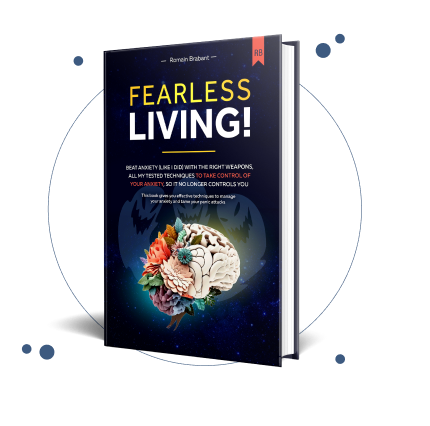
Living with anxiety can feel like being trapped in a constant state of alert, but there is immense hope for healing and reclaiming a life free from panic. The journey often begins with a single, powerful step: understanding what you're experiencing. Mental health screening tools are not just clinical questionnaires; they are maps that can illuminate the path forward, showing you that a way out truly exists.
They provide a structured way to look at your symptoms, helping you and professionals identify patterns and measure progress on your healing journey. This guide is designed to introduce you to a range of validated mental health screening tools, from free, self-guided checklists for personal insight to comprehensive platforms used by healthcare providers. We cut through the complexity to give you a clear, practical overview of the best options available.
For each resource, you will find direct links, screenshots, and an honest assessment of its intended use, helping you select the right instrument for your specific needs. Think of these tools as the first key to unlocking a future where you are in control, equipped with the knowledge to manage anxiety effectively. Healing is not just a distant possibility; it is an achievable goal, and it starts with gaining clarity. This list will show you where to begin your journey toward a panic-free life.
1. The Anxiety Checklist
The Anxiety Checklist offers a uniquely structured and action-oriented approach to anxiety management, making it our featured choice. Rather than a passive screening tool, it functions as an interactive system designed to empower users to actively confront and manage anxiety symptoms. This digital toolkit, born from 15 years of lived experience, provides a clear pathway for those feeling lost in the cycle of chronic anxiety, offering tangible steps toward regaining control and living panic-free.
Its core is the 93-point interactive checklist, a powerful instrument for translating abstract recovery concepts into daily, manageable actions. This tool helps users systematically address triggers, implement coping strategies, and build resilience over time. It’s a standout option among mental health screening tools because it moves beyond identification into practical, daily application, showing you that healing is possible through consistent, small steps.
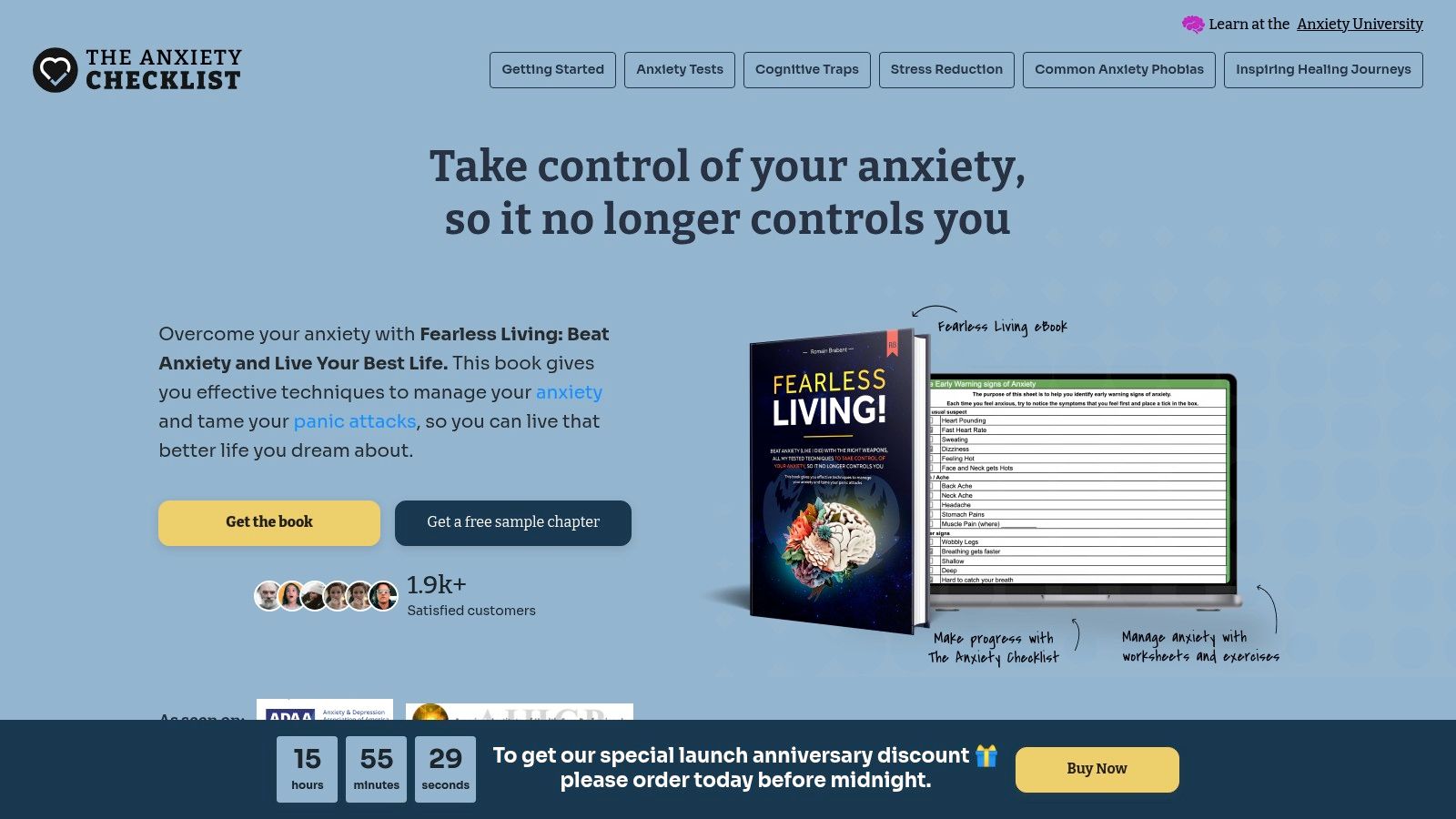
Key Features and Use Cases
The platform is built for immediate implementation. It combines an insightful eBook explaining the mechanics of anxiety with customizable worksheets, including a habit tracker and symptom checklists. This makes it exceptionally versatile for various users:
- Individuals: A self-directed person can use the checklist to build a personalized daily routine for managing anxiety triggers and developing healthier cognitive habits, fostering a sense of hope and control.
- Therapists: A busy clinician can integrate the worksheets and checklists into a client's treatment plan, providing structured homework that reinforces session concepts and accelerates healing.
- Supportive Loved Ones: Family members can use the eBook and tools to better understand anxiety and learn practical ways to support someone on their path to recovery.
Expert Insight: The system's strength lies in its synthesis of evidence-informed resources (from sources like Harvard Medical School and James Clear) with the creator's relatable journey. This blend of scientific backing and genuine empathy provides users with a sense of hope and a practical, non-clinical framework for recovery.
Pricing and Access
The digital products are available for instant download with a one-time payment and include lifetime updates.
| Product | Standard Price | Current Price |
|---|---|---|
| eBook Only | $29 | $19 |
| Checklist Only | $49 | $28 |
| eBook + Checklist Bundle | $78 | $47 |
Pros:
- Highly Actionable: The 93-point checklist and worksheets convert theory into practical daily steps.
- Affordable: A low-cost, high-value alternative or supplement to traditional therapy.
- Evidence-Informed: Curates and applies principles from reputable health and habit-formation experts.
- Versatile: Suitable for self-help, therapeutic support, and family use.
Cons:
- Not a clinical treatment or substitute for professional medical advice.
- Requires significant self-discipline and sustained effort.
- Digital downloads are non-refundable.
Visit The Anxiety Checklist Website
2. Pearson Clinical (Q-global and Digital Assessment Library for Healthcare)
For clinicians, health systems, and researchers, Pearson Clinical provides an enterprise-grade platform for administering validated mental health screening tools. It's a comprehensive digital hub rather than a single tool, offering access to a vast catalog of gold-standard assessments like the Beck Depression Inventory (BDI-II) and the Minnesota Multiphasic Personality Inventory (MMPI) through its Q-global web platform.
This platform stands out for its robust, HIPAA-aligned infrastructure designed for professional settings. It supports everything from in-office digital administration to fully remote telepractice workflows, complete with automated scoring and detailed report generation. This systemization provides a reliable framework for tracking patient progress, which is a critical part of a successful journey toward healing from conditions like chronic anxiety. While it offers powerful tools, access requires professional qualifications for many assessments, and its pricing is complex. The per-use or subscription costs are geared toward clinical or institutional budgets, not individual users.
- Best For: Clinics, hospitals, private practices, and research institutions needing a scalable, secure platform for a wide range of industry-standard psychological assessments.
- Key Feature: The Digital Assessment Library for Healthcare (DAL HC) bundles numerous digital assets and report uses, streamlining access for large organizations.
- Website: https://www.pearsonassessments.com
3. PAR, Inc. (PARiConnect)
Similar to Pearson, PAR is a leading publisher of psychological assessments, and its PARiConnect platform offers a modern, HIPAA-compliant digital solution for clinicians. This online system is built to administer, score, and interpret dozens of well-regarded mental health screening tools. It excels in providing flexible administration options, supporting both remote client assessments via email links and in-clinic testing on a dedicated computer.
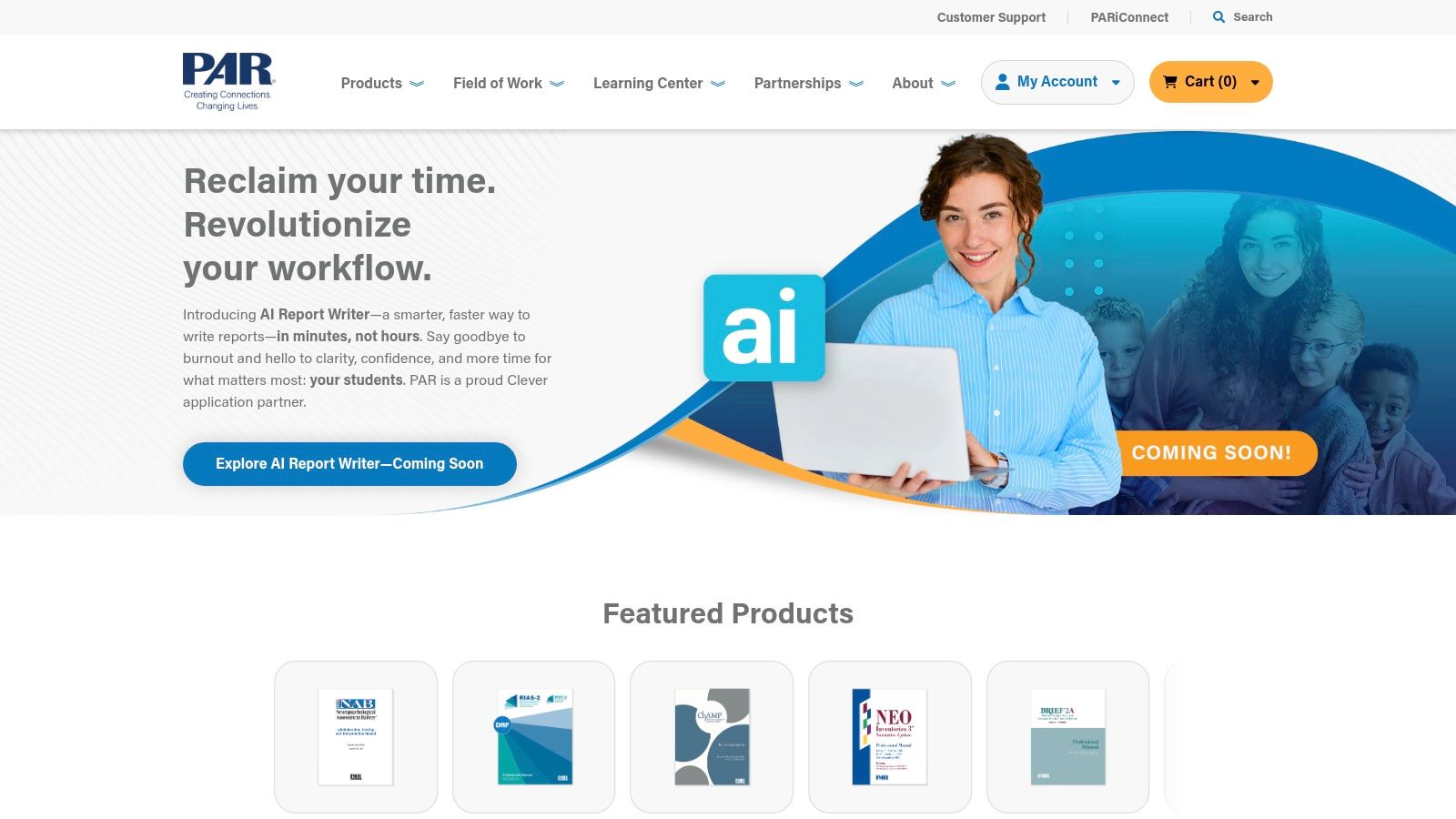
What sets PARiConnect apart is its user-friendly interface, strong customer support, and reliable performance, which are crucial when integrating digital tools into a clinical workflow. The platform’s SOC 2 Type 2 security compliance provides an extra layer of assurance for data protection. While access to many instruments requires professional qualifications, the pay-per-report model can be cost-effective for smaller practices. This structured approach to assessment helps create a clear path toward understanding and managing conditions like chronic anxiety, forming a solid foundation for a journey toward lasting healing.
- Best For: Small to mid-sized clinics, private practitioners, and school psychologists who need a reliable, user-friendly platform with strong vendor support and flexible test administration.
- Key Feature: The ability to re-run interpretive reports on a specific client's results at no extra cost, allowing for deeper analysis without incurring additional fees.
- Website: https://www.parinc.com
4. Multi-Health Systems (MHS) – Online Assessment Center+
Multi-Health Systems (MHS) provides a streamlined platform for professionals using its widely recognized, evidence-based mental health screening tools. The MHS Online Assessment Center+ is a modern portal designed for both remote telepractice and in-clinic administration of popular assessments like the Conners Scales for ADHD or the Clinical Assessment of Self-Injury (CASI). It simplifies the entire workflow from inviting clients to generating comprehensive reports.
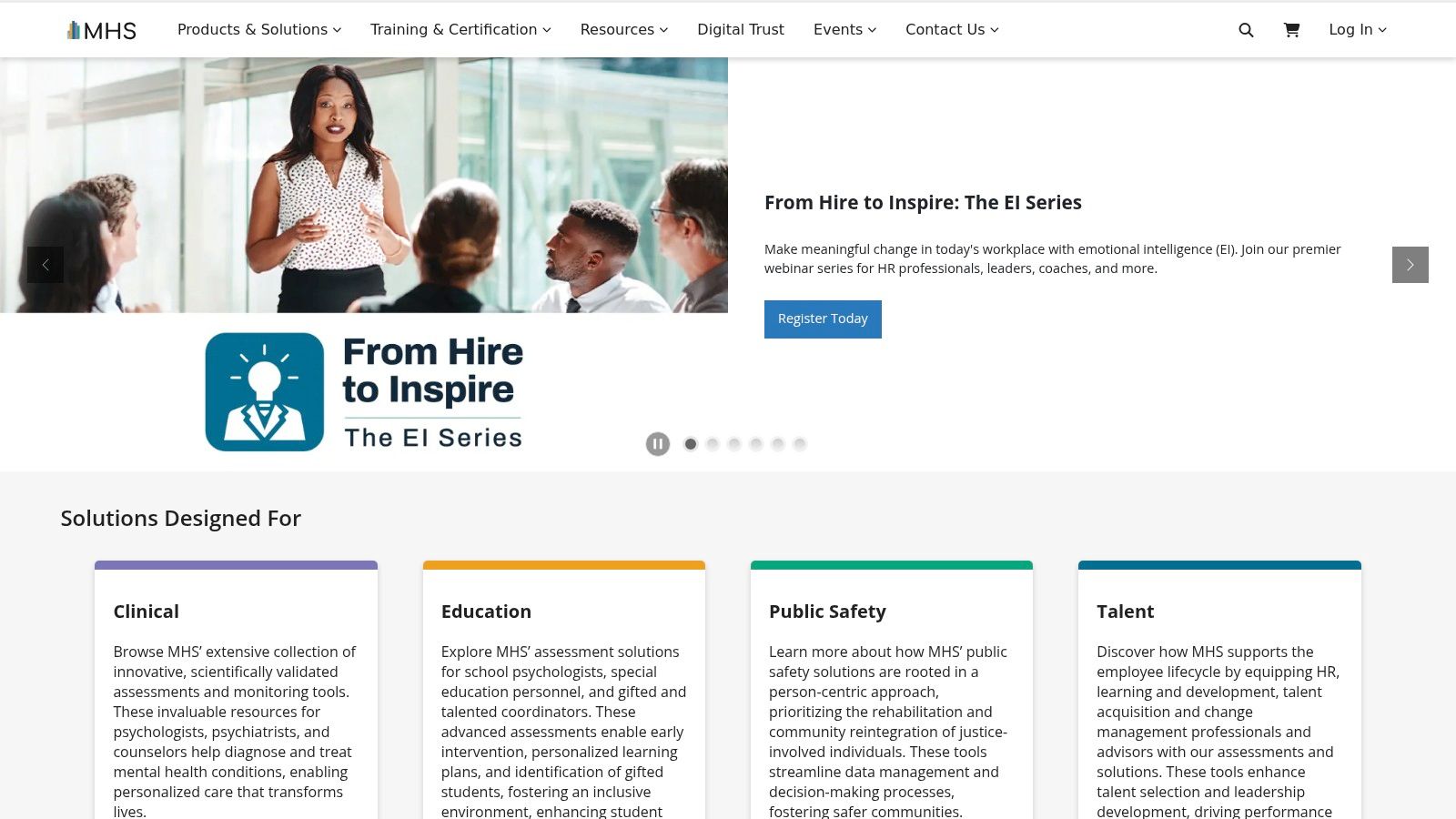
The platform stands out for its user-friendly transition from paper-based to digital assessment, making it a strong choice for practices looking to modernize. A key operational feature is its inventory management, where digital "uses" are only consumed upon scoring a report, not just for sending a form. This flexibility allows clinicians to print paper forms from the portal without cost, supporting hybrid models of care. While the portal is intuitive, access to many tools requires B- or C-level professional qualifications, and pricing is typically provided via direct quotes, reflecting its focus on organizational, not individual, use.
- Best For: Pediatric and adult behavioral health practices, school psychologists, and clinicians seeking an efficient, end-to-end digital workflow for specific MHS assessments.
- Key Feature: The flexible system allows printing of paper forms without consuming a digital use, which is only counted when a report is scored and generated.
- Website: https://mhs.com
5. WPS (Western Psychological Services) – WPS Online Evaluation System
For practitioners and educational professionals, WPS provides a robust platform for administering and scoring well-regarded mental health screening tools. The WPS Online Evaluation System is a digital portal that supports a wide range of behavioral and psychological assessments, facilitating online forms, automated scoring, and detailed progress monitoring. It is particularly useful for environments requiring feedback from multiple sources, such as parents and teachers.
The platform distinguishes itself with a flexible, per-use billing model and strong support for multi-rater workflows, allowing clinicians to compare perspectives and track changes over time. This detailed tracking is a powerful asset in managing conditions like chronic anxiety, as it provides tangible evidence of progress, offering hope and validation on the path to healing. While the system is HIPAA and FERPA compliant, access requires purchasing a license for each assessment, and costs can vary significantly between different measures, making it essential to budget on a per-tool basis.
- Best For: School psychologists, clinical practitioners, and organizations that utilize multi-rater feedback (e.g., from parents and teachers) and prefer a pay-per-assessment model.
- Key Feature: The platform’s strength in generating multi-rater comparison and progress monitoring reports, which simplifies the process of synthesizing data from different observers.
- Website: https://www.wpspublish.com
6. Hogrefe Publishing (U.S.) – Hogrefe Testsystem (HTS)
For professionals seeking specialized clinical and occupational assessments, Hogrefe Publishing serves as a key international publisher with a dedicated U.S. presence. Their Hogrefe Testsystem (HTS) is a versatile online platform for administering a wide array of mental health screening tools and other psychological instruments. This system is designed for practitioners who need reliable, scientifically validated tests that may not be available through larger, more generalized platforms.
The platform stands out by offering a curated selection from European and international test development, alongside U.S.-focused customer support and straightforward shipping. Access to most clinical tools requires professional qualification screening (A/B/C/H levels), ensuring ethical and appropriate use. The HTS platform operates on a subscription plus per-use package model, which provides flexibility for clinics and researchers managing their assessment budgets. This structured approach to testing provides a clear pathway for understanding complex conditions like chronic anxiety, offering the precise data needed to forge a successful path toward healing.
- Best For: Private practices, researchers, and specialized clinics seeking a diverse catalog of international and U.S.-based psychological tests with dedicated online administration.
- Key Feature: The U.S.-specific webshop and support system simplifies access to a global test catalog, complete with clear qualification requirements and flat-rate shipping.
- Website: https://www.hogrefe.com/us
7. PHQ Screeners (Pfizer) – Official PHQ/GAD site
For primary care providers and behavioral health professionals seeking foundational, no-cost mental health screening tools, the official PHQ Screeners website is an essential resource. Developed and maintained by Pfizer, this site serves as the official distribution point for the widely used Patient Health Questionnaire (PHQ-9, PHQ-8, PHQ-2) and Generalized Anxiety Disorder (GAD-7) scales. It is not a software platform but a library, offering free downloads of the instruments, scoring instructions, and dozens of translations.
This site's key advantage is its explicit permission statement, which allows for free reproduction and distribution, making it the definitive source for integrating these gold-standard screeners into electronic health records (EHRs) or clinical workflows without licensing fees. While it provides the tools, it lacks any digital administration or scoring capabilities, requiring manual implementation or integration into a separate system. This straightforward access provides a vital first step in identifying symptoms, a cornerstone of any effective plan to find relief and live panic-free. You can learn more about how the GAD-7 is used to measure anxiety.
- Best For: Healthcare organizations, clinics, and individual practitioners needing free, unrestricted access to the official PHQ and GAD screening instruments for integration into their own systems.
- Key Feature: Free availability of validated, translated versions of the PHQ and GAD scales with explicit permission for clinical use and reproduction.
- Website: https://www.phqscreeners.com
8. Mental Health America (MHA) – Free Online Screening
For individuals seeking a first step toward understanding their mental health, Mental Health America offers a powerful and accessible entry point. This U.S.-focused, non-profit-led platform provides a suite of free, confidential, and validated mental health screening tools directly to the public. Covering conditions from depression and anxiety to bipolar disorder and PTSD, it empowers users to explore their symptoms in a private, non-judgmental environment, which is often a crucial first step on the path to healing.
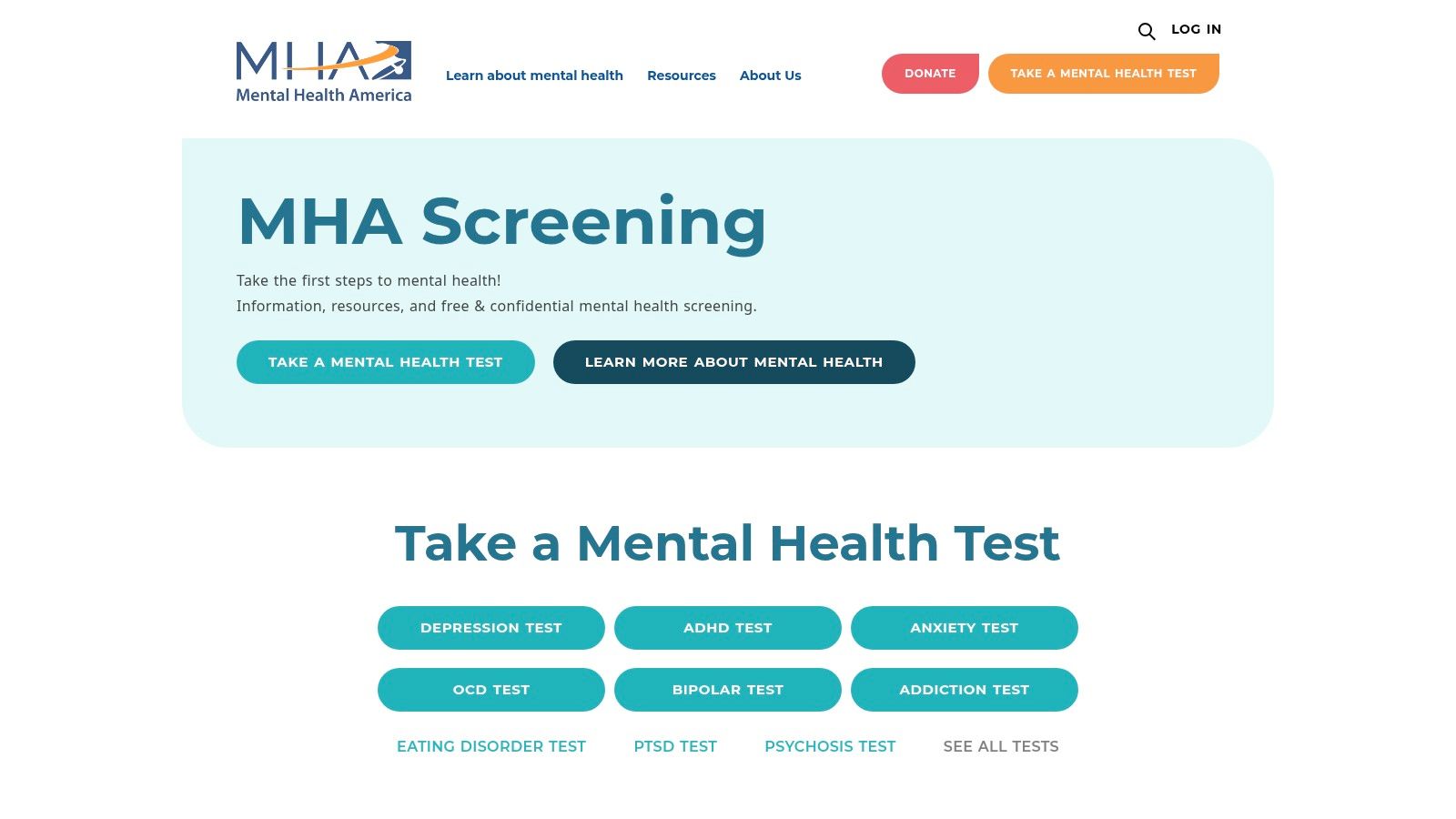
MHA stands out by pairing validated assessments with clear, plain-language explanations of the results and actionable next steps. While these screens are not a substitute for a professional diagnosis, they serve as an excellent educational resource to help individuals recognize their experiences and find the language to discuss them with a healthcare provider. This self-awareness can be an incredibly hopeful and motivating milestone, providing clarity and direction for those starting their journey toward a life free from chronic anxiety. Before taking a broader test, you can learn more about a specific anxiety test to understand its structure. The platform's major limitation is its lack of direct clinical integration, as it is designed for consumer education rather than professional use.
- Best For: Individuals wanting a quick, free, and confidential way to self-screen for common mental health conditions and access educational resources for next steps.
- Key Feature: Immediate, easy-to-understand results paired with high-quality information and resources, helping to demystify mental health symptoms.
- Website: https://screening.mhanational.org
9. HealthMeasures (PROMIS) and Assessment Center API
For researchers, healthcare systems, and tech developers, HealthMeasures offers a modern approach to mental health screening tools through its Patient-Reported Outcomes Measurement Information System (PROMIS). This initiative, funded by the NIH, provides highly validated, flexible assessments for domains like depression, anxiety, and global mental health using advanced psychometric methods like Item Response Theory (IRT).
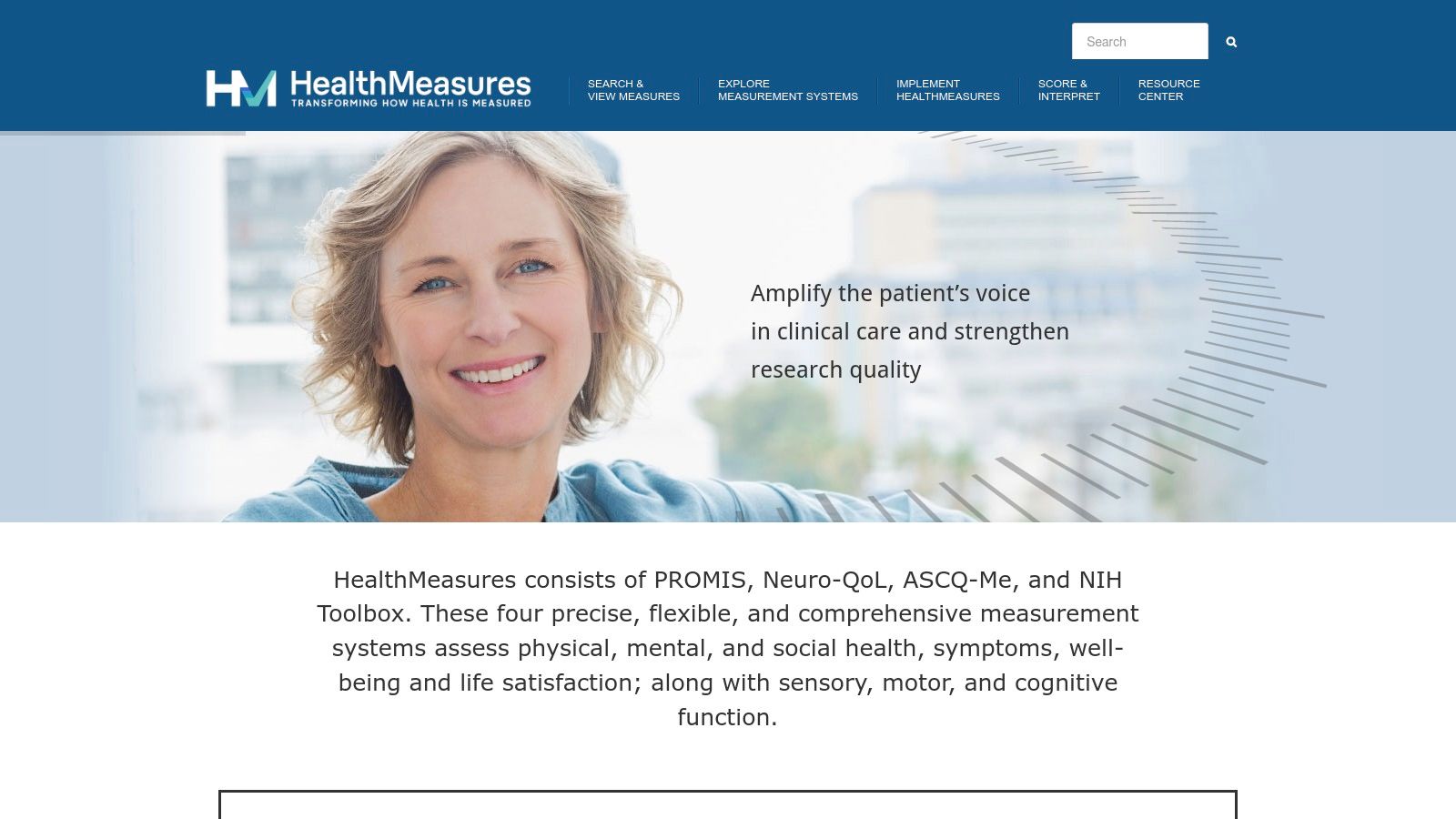
What makes this platform unique is its emphasis on computerized adaptive testing (CAT), which tailors questions to the individual, providing a precise score with fewer items. This efficiency is a significant step forward in monitoring conditions like chronic anxiety, allowing for more frequent and less burdensome check-ins. While the measures are often free for noncommercial use, integrating them into an EHR or app via the Assessment Center API requires technical expertise and may involve licensing fees for certain uses. However, this investment can yield a powerful, streamlined system for tracking the incremental steps of a healing journey, reinforcing that progress is always possible.
- Best For: Health systems, research studies, and digital health platforms seeking to integrate precise, efficient, and psychometrically advanced measures for patient-reported outcomes.
- Key Feature: Computerized Adaptive Testing (CAT) offers tailored, efficient assessments that reduce patient burden while maintaining high precision, ideal for longitudinal tracking.
- Website: https://www.healthmeasures.net
10. APA PsycTests (via APA/EBSCO/ProQuest)
For researchers, graduate students, and clinicians, APA PsycTests serves as an indispensable research database for discovering validated mental health screening tools. Instead of being a platform for administering tests, it’s a massive library containing thousands of psychological measures, many of which are non-commercial and difficult to locate otherwise. It provides the full instrument, scoring guides, and detailed records on reliability and validity, empowering professionals to find the right tool for their specific needs.
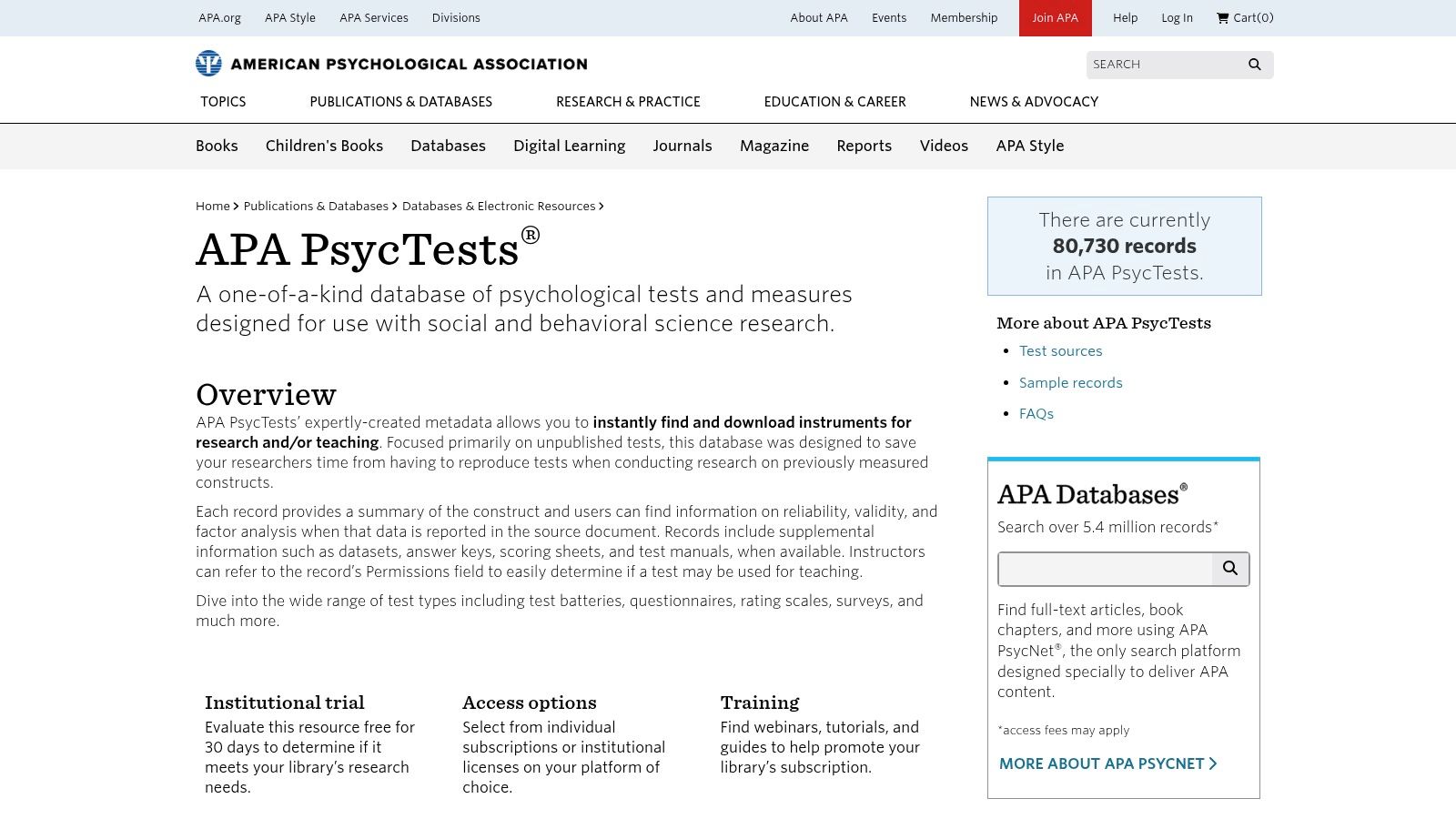
The platform’s strength lies in its comprehensive, structured records, which save countless hours of literature review. It helps ensure that the chosen assessments are appropriate and evidence-based, a crucial step in understanding complex conditions. This foundation of knowledge can clarify how certain thought patterns, like those discussed in guides to cognitive distortions, are measured and evaluated. Access is its main limitation, as it typically requires an institutional subscription through university libraries or major database providers like EBSCO and ProQuest, placing it out of reach for most individuals.
- Best For: Academic researchers, students, and clinicians needing to find and evaluate a wide range of existing psychological tests and measures for clinical or research use.
- Key Feature: Provides downloadable, full-text PDFs of many non-commercial instruments, complete with scoring instructions and psychometric data, directly within the database.
- Website: https://www.apa.org/pubs/databases/psyctests
11. CHADIS – Mental Health Screening Tools for Pediatric and Primary Care
CHADIS (Child Health and Development Interactive System) is a clinical process support platform specifically designed to integrate mental health screening tools into pediatric and primary care workflows. It excels at collecting pre-visit data from families, allowing parents to complete validated screeners for developmental, behavioral, and mental health conditions from home before an appointment. This streamlines in-office time, equipping providers with crucial insights the moment the visit begins.
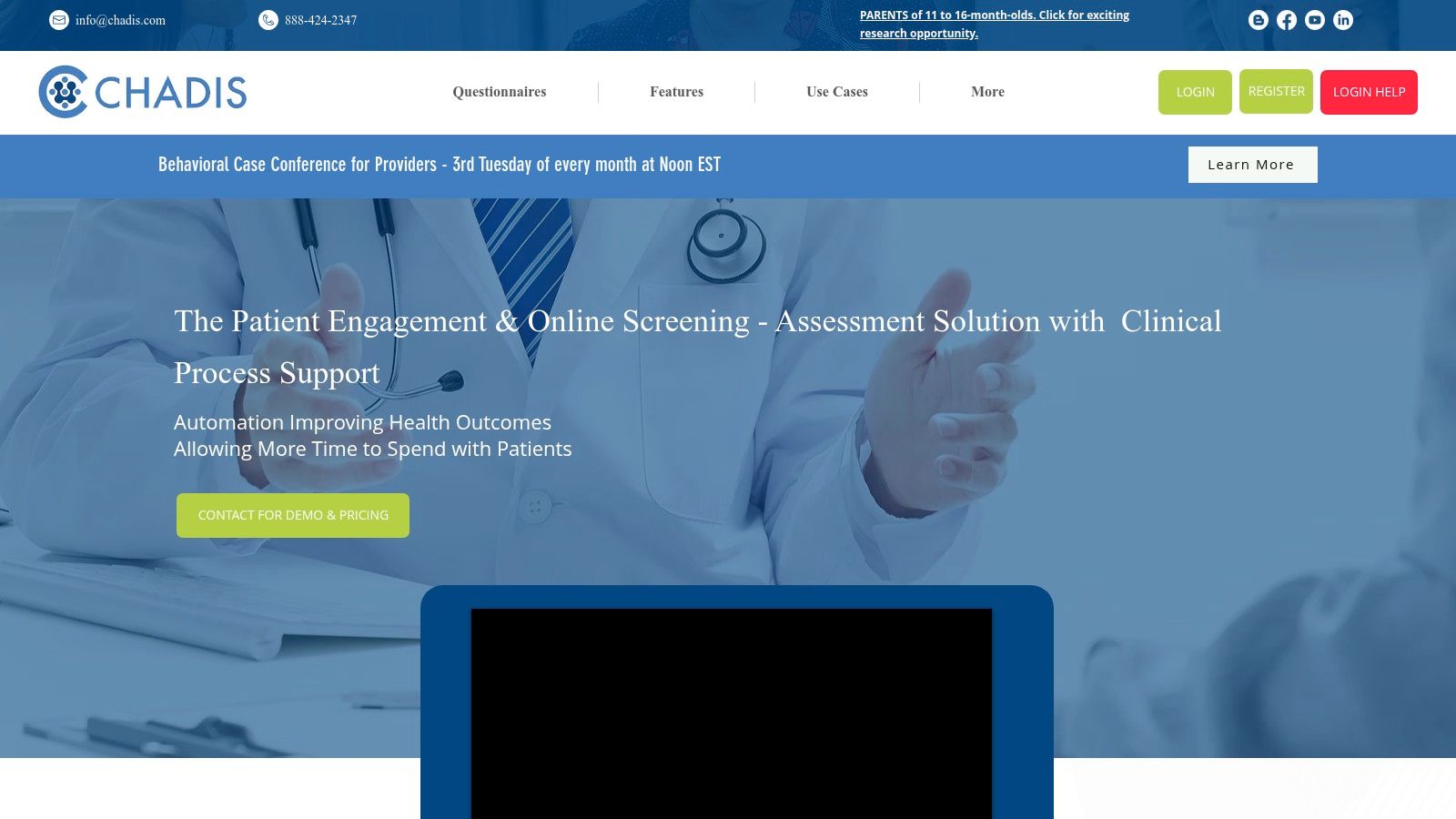
The platform's strength lies in its extensive library of hundreds of evidence-based measures and its focus on practice efficiency. By automating reminders and integrating with telehealth, CHADIS helps busy clinics systematically identify and address issues early, which is a vital step in helping a child get the right support for conditions like anxiety disorders. This early intervention can make all the difference, setting the stage for a healthier, more hopeful future. While it's an exceptional tool for clinical settings, its pricing is quote-based and tailored for organizations, not individual users, requiring a sales consultation for access.
- Best For: Pediatric practices, family medicine clinics, and integrated care systems looking to embed automated, pre-visit screening into their standard patient workflow.
- Key Feature: A massive library of validated screeners for all ages that can be assigned to patients for completion before their telehealth or in-office appointment.
- Website: https://site.chadis.com
12. Owl Practice – EHR with Measurement-Based Care
For solo practitioners and group practices, Owl Practice embeds validated mental health screening tools directly into its practice management and Electronic Health Record (EHR) system. It’s designed around the principle of Measurement-Based Care, allowing clinicians to seamlessly administer assessments from a library of over 85 clinical measures, including the standard PHQ-9 and GAD-7, and track client progress over time through integrated dashboards.
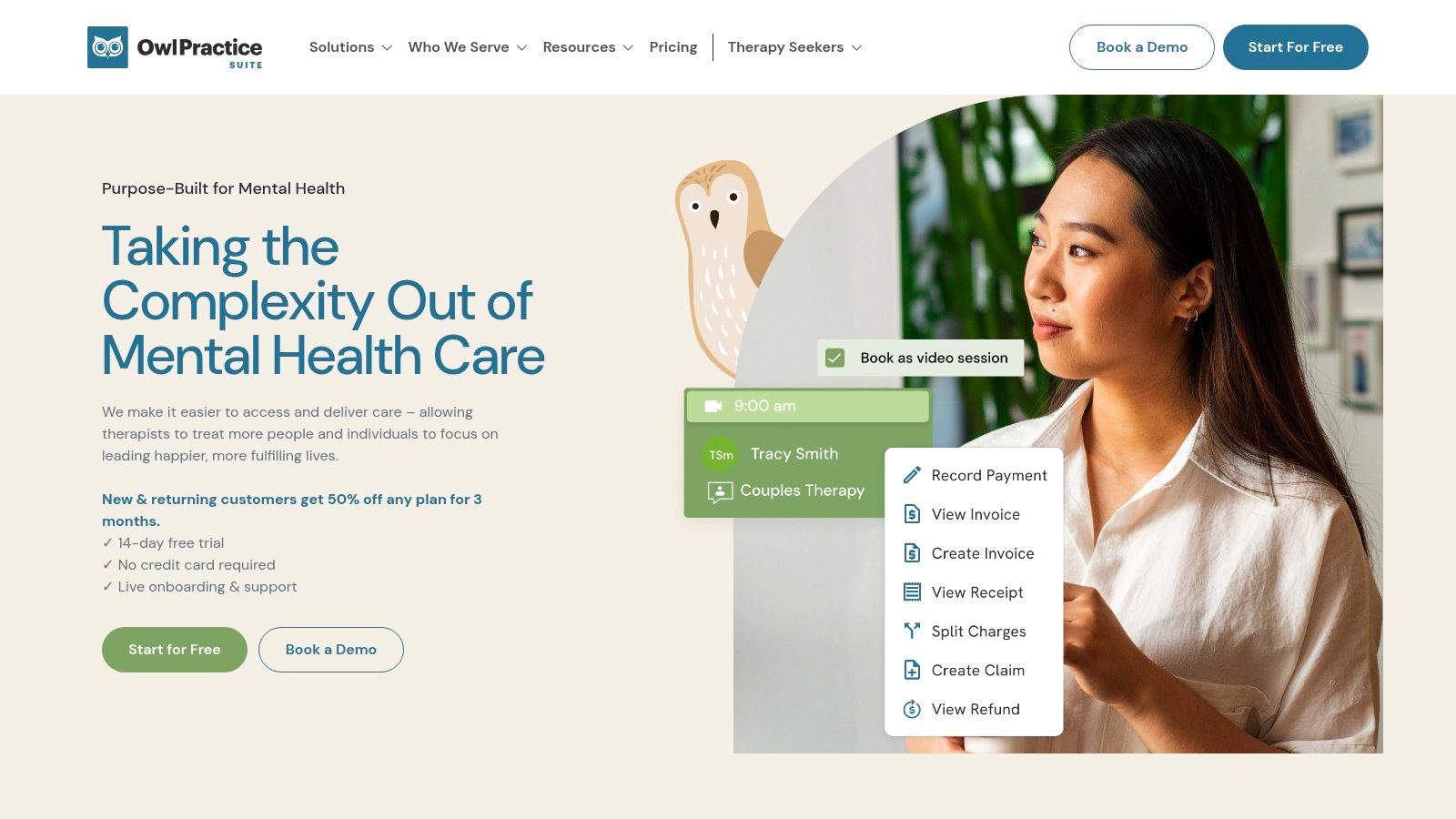
This platform excels by making outcomes tracking a core part of the clinical workflow, not an add-on. For systems like Owl Practice that emphasize measurement-based care, efficient patient charting software is essential for tracking screening results and progress. This integration helps clinicians and clients visualize the journey toward healing from conditions like chronic anxiety, providing concrete evidence that their hard work is paying off. While entry-level pricing is transparent, accessing the full suite of measurement tools and advanced features requires the Pro tier. It's a comprehensive practice suite rather than a standalone assessment publisher, making it ideal for those who want an all-in-one solution that supports effective psychotherapy for anxiety.
- Best For: Solo and group mental health practices in the U.S. and Canada seeking an all-in-one EHR that integrates Measurement-Based Care and outcomes tracking directly into their workflow.
- Key Feature: The built-in library of 85+ clinical measures combined with outcomes dashboards provides a powerful, data-driven approach to client care.
- Website: https://owlpracticesuite.com
Comparison of 12 Mental Health Screening Tools
| Product | Core features | Quality (★) | Price/Value (💰) | Target (👥) | Unique selling points (✨) |
|---|---|---|---|---|---|
| The Anxiety Checklist (Fearless Living) 🏆 | eBook + 93‑pt interactive checklist, habit/symptom worksheets, lifetime updates | ★★★★☆ | 💰 $19–$47 (bundle $47) — low‑cost | 👥 Self‑helpers, loved ones, therapists | ✨ Action‑first, lived‑experience + curated evidence |
| Pearson Clinical (Q-global & DAL HC) | Web admin/scoring/reporting, DAL HC assets, telepractice, HIPAA options | ★★★★★ | 💰 Complex: per‑use / subs / license tiers | 👥 Clinics, health systems, enterprises | ✨ Gold‑standard catalog; enterprise/HIPAA ready |
| PAR, Inc. (PARiConnect) | 80+ instruments, batch sends, paper scoring, HIPAA & SOC2 | ★★★★★ | 💰 Pay‑per‑report/uses; costs scale | 👥 Clinics, schools, assessment teams | ✨ Reliable uptime, strong support & training |
| Multi‑Health Systems (Online Assessment Center+) | Invite/score/report, printable paper forms, inventory & reminders | ★★★★★ | 💰 Per‑product / per‑use; quote required | 👥 Pediatric & adult behavioral health clinics | ✨ Smooth paper→digital transition, clear ordering |
| WPS (Online Evaluation System) | Online scoring, multi‑rater comparisons, progress monitoring | ★★★★☆ | 💰 Per‑completed‑form + license per assessment | 👥 Clinics using multi‑rater scales | ✨ Multi‑rater & progress tracking workflows |
| Hogrefe (HTS) | U.S. webshop, qualification screening, HTS subscription/per‑test packages | ★★★★☆ | 💰 Subscription + per‑test; shipping fees | 👥 Clinics & researchers needing specific tests | ✨ International catalog with U.S. support |
| PHQ Screeners (Official PHQ/GAD) | Free PHQ/GAD instruments, instructions, translations, reproduction allowed | ★★★★ | 💰 Free | 👥 Primary care & behavioral health clinicians | ✨ Official, freely distributable standard screeners |
| Mental Health America (Free Online Screening) | Multiple validated screens, plain‑language results & guidance | ★★★★☆ | 💰 Free | 👥 Consumers, patient education, clinicians | ✨ Broad free screening + recommended next steps |
| HealthMeasures (PROMIS) & Assessment Center API | PROMIS item banks, CAT, short forms, API & Assessment Center | ★★★★★ | 💰 Mostly free for many uses; API/setup costs possible | 👥 Researchers, health systems, developers | ✨ IRT/CAT modern measurement + integration API |
| APA PsycTests (APA/EBSCO/ProQuest) | Database of tests, scoring instructions, reliability/validity records | ★★★★ | 💰 Institutional/subscription access | 👥 Researchers & clinicians seeking measures | ✨ Large searchable archive with test documentation |
| CHADIS | Pre‑visit family completion, real‑time data, large measure library, reminders | ★★★★★ | 💰 Quote‑based (practice pricing) | 👥 Pediatric & primary care practices | ✨ Embedded pre‑visit workflows & clinical supports |
| Owl Practice (EHR with Measurement‑Based Care) | EHR + 85+ measures, MBC dashboards, telehealth, e‑forms, billing | ★★★★☆ | 💰 Transparent entry pricing; Pro tier for full features | 👥 Solo & group mental health practices | ✨ Integrated EHR + outcomes tracking for clinics |
Your Roadmap to a Fearless Future
Navigating the path away from chronic anxiety and panic can feel daunting, but as this guide has shown, you are not without a map. The comprehensive array of mental health screening tools we have explored, from free self-assessments like those from Mental Health America to sophisticated clinical platforms like Q-global and PARiConnect, provides a powerful starting point. These instruments are not meant to be labels; they are compasses designed to offer direction, clarify your experiences, and track your progress toward a calmer state of being.
The journey to a panic-free life is one of courage and consistent action. Understanding the landscape of your anxiety is the first critical step in disarming its power. Each small insight you gain from a screener and every new coping skill you practice is a victory, a foundational stone laid for a more resilient and hopeful future.
Charting Your Next Steps
Choosing the right tool depends entirely on your unique situation.
- For Individuals: If you're just beginning to explore your anxiety, starting with accessible, free resources like the PHQ screeners or MHA's online tests can provide valuable initial insights without any commitment. They empower you with the language to understand what you're feeling and the hope that you can get better.
- For Supporters: Family and friends can use the information in this guide to better understand the clinical side of anxiety, helping them encourage loved ones to seek professional, evidence-based support on their healing journey.
- For Clinicians: Professionals can weigh the features of platforms like Owl Practice or CHADIS against their practice's needs, focusing on factors like EMR integration, billing capabilities, and the specific assessment libraries offered to implement effective measurement-based care.
Implementing Tools with Purpose
Regardless of which path you choose, remember that a tool is only as effective as its implementation. Consistent use is key. A one-time screening provides a snapshot, but regular check-ins reveal the patterns and progress over time. Be honest with your answers, whether you are completing a self-assessment or working with a therapist. This data is for you, and its accuracy is paramount to your healing.
As technology continues to evolve, so will the accessibility and design of these vital resources. The future of mental health support relies on creating digital environments that are not only functional but also empathetic and accessible. This involves a deeper commitment to building inclusive web spaces for mental well-being, ensuring that everyone, regardless of their mental state or technical ability, can access the help they need without added stress.
Ultimately, these tools are gateways to deeper understanding and proactive change. They bridge the gap between feeling overwhelmed and taking control. There is a hopeful, peaceful life waiting for you beyond the grip of panic, and with the right resources and support, you have everything you need to build it.
Ready to take the first, most important step on your roadmap? The Anxiety Checklist is a self-guided tool designed to do more than just screen; it helps you build the daily habits and coping skills to manage anxiety effectively. Move from understanding your anxiety to actively overcoming it by downloading The Anxiety Checklist today.

